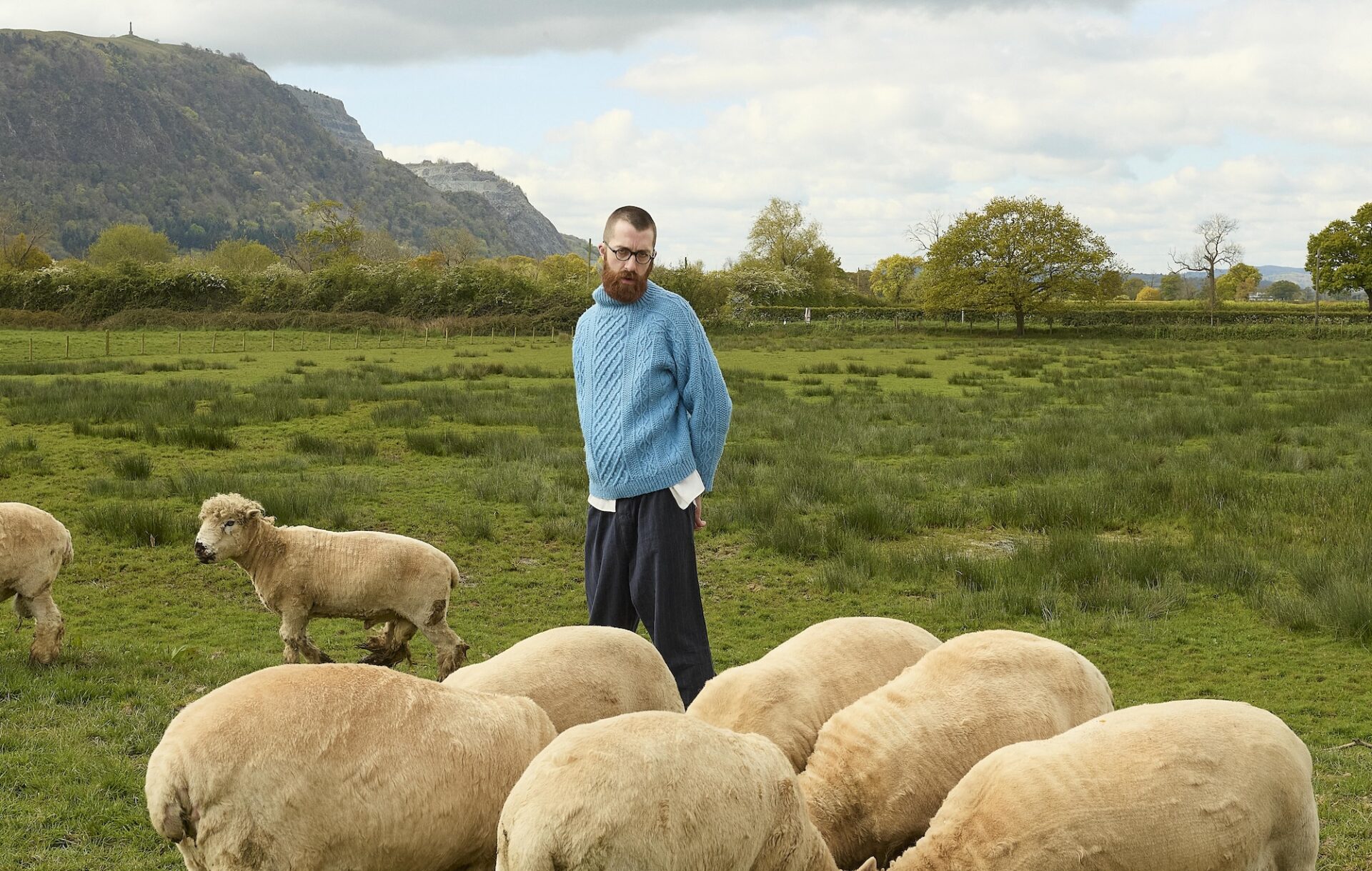Oscar-nominated composer Jerskin Fendrix on diving into childhood with his stunning new album
The prodigiously talented musician discusses ‘Once Upon a Time… in Shropshire’, learning from Yorgos Lanthimos and the importance of artistically embarrassing yourself

On ‘Beth’s Farm’, the first song from Jerskin Fendrix’s astounding new album Once Upon a Time… in Shropshire, the musician and composer remembers a time of pure, untarnished innocence in his childhood. “You’re laughing and the moonlight’s shining bright across the crops / There’s no pain here, there’s no blood here,” he sings over sprightly instrumentation, recounting memories of blissful times at his friend’s family farm, just over the border in Wales from his Shropshire home.
“It’s a ridiculously bucolic place,” he remembers. Living on the farm were all manner of rare species of sheep, buffalo, “weird cows” and “really odd breeds of chicken.” He and his friends would spend countless days there across their childhood. The song’s chorus circles around the refrain: ‘Nobody dies on Beth’s farm,’ nodding to its existence as a ‘deathless’ farm, but also as an allegory for a time before his innocence was “corrupted” by the inevitable but still crushing realities of life. The song, he says, “was a good way of setting [the story] up… so it could get knocked down later.”
It’s not surprising to learn that the album’s working (and unofficial) title is 10 Folk Songs about Love and Death in the Countryside. On it, Fendrix vulnerably and wholeheartedly tells stories from his upbringing with glee, despair and confusion in equal measure. It began taking shape after a number of deaths close to him, including his father and a close childhood friend. Heading back to Shropshire in lockdown, he aimed to distil all these feelings – the uninhibited thrill of childhood and the corruption that follows.
“I wanted it to feel pastoral, and to have this sense of the landscape, this wideness of the space, and the overwhelming feeling you get from these really beautiful natural spaces,” he explains of the album’s sound. With a glint of that childlike wonder remaining, he tells stories of 20 of his friends getting snowed in at his parents’ house at a party one Christmas time and staying for three days, and how the relative boredom of the countryside made their childhood games all the more creative (specifically ‘brick tree’, where “you throw a brick into a tree and you’re not allowed to move as it falls down”). “Being bored in a very beautiful place is a great way of being brought up,” he smiles.
As the album progresses, the bliss of ‘Beth’s Farm’ descends into darker, more complicated and conflicted feelings. On ‘Sk1’, he stoops to a gorgeous, rich baritone reminiscent of Leonard Cohen and sings: “Think it’s time to leave the party / charge my Juul and finish off the Baileys.”
Fendrix takes on countless different voices across the album, be it as himself now, as a child or a younger man, as the people he has lost, or the voices in his head. It’s all done through lyrics that are delightfully specific, and things that “everyone has their own version of”. Even if they can’t relate specifically to him downing White Claws in a Shropshire living room. “Writing about death or childhood or nature can get so fucking…” he says, trailing off with frustration. “Writing specifically helps it be more universal.”
Also driving the album is his embrace of a relentless and admirable earnestness that many would swerve. “I’ve always felt pretty secure in embarrassing oneself artistically,” he says. It’s an ethos he developed with Jack Merritt, the singer of the band Famous, with whom Fendrix played with for a time. At a 2020 gig at the Brixton Windmill, Fendrix played his first solo show when the opening act for a Famous gig didn’t show. “We spent a lot of time talking being very open, potentially to an embarrassing degree,” he says. “With a lot of lyricists, it just feels a bit too slick, a bit too poetic. I’m very British. In real life, I don’t really enjoy getting embarrassed very much. But artistically, that’s the place where I think it’s an important form of honesty.”

The creation of Once Upon a Time… was splintered by Fendrix becoming a close collaborator of the director Yorgos Lanthimos and being thrust into the world of Hollywood. Catching Lanthimos’ ear with his debut album Winterreise, the director brought him on board to compose the score for Poor Things, which landed Fendrix both an Oscar and Golden Globe nomination. He has since worked on the scores for Kinds of Kindness and the upcoming Bugonia. Lanthimos and his frequent star Emma Stone return the favour, respectively directing and starring in the music video for ‘Beth’s Farm’.
In returning to the album between Hollywood press tours and time focusing on his film scores, he was able to reflect on the level of honesty (or dishonesty) that he felt in the album so far, as well as process and write about further deaths that surrounded him. “I could come back to a song and think, ‘Oh, this isn’t accurate. I’m being dishonest with this emotion. That’s not how I really felt. That’s not what really happened. It just seemed kind of sexy or faux poignant to do at the time’,” he says. “It allowed me to get it right, stopping for such a long time and thinking, ‘What do I actually want to say?’”
He says that working on the film scores also allowed him to approach the deeply personal record with a wider lens. “Writing film scores is the opposite of autobiographical. You have to be really empathetic to the characters to write for them, and I ended up writing more empathetically for this album than I would have done otherwise.”
In Lanthimos, he says that he’s found a collaborator that has both challenged and somewhat upended his creative process. “He’s a very hands-off director,” Fendrix says. “He chooses who he wants to work with, and spends a lot of time choosing. Then he basically just says, ‘Go and do it’. You do some stuff, and he’ll say yes or no, and if he says yes, then it’s in the film and you can’t do anything about it.”
As such, a host of scratchy demo recordings for Poor Things ended up in the final edit. While he was given the script and some pointers for the first film, Kinds of Kindness saw him provided slightly less by the director, and for Bugonia it was trimmed down even further to just three prompt words.
Does he remember them? Fendrix laughs at the suggestion, intonating instead that the words became the centre of his universe for a time. “Bees. Spaceships. Basements.”
Fendrix then went about excruciatingly researching all three topics. He already happened to know a fair bit about bees, and spaceships are easy enough to research. Basements unsurprisingly proved more difficult. The power of such limited guidance, though, was a commitment to instinct and transmitting a feeling, the same thing that powers Once Upon a Time… in Shropshire.
Across his new album is a disregard for genre (“I find it baffling to be a ‘fan’ of a genre,” he says) as he handbrake turns between dissonant post-punk-meets-jazz on ‘Jerskin Fendrix Freestyle’ and something closer to a show tune on ‘Together Again’, always leaving any idea of ‘cool’ at the door. It helps that he has a superbly dextrous voice, which can go from foreboding baritone to gorgeous falsetto and back again while sprinkling in everything in between.
The resulting album is the product of a five-year period that has shown the Shropshire boy as a great young composer of our time, able to dive into Hollywood scripts and extract the feeling at the core of them. It should be no surprise, then, that he also tells his own story here with unflinching honesty and elite skill.
Sometimes childhood – Jerskin Fendrix’s or anyone else’s – is joyous and uncomplicated. Sometimes it’s coloured by grief, things changing and people leaving. Sometimes it’s also downright stupid. To end the album, he samples a recording of his friends singing an endearingly daft made-up song that they ring in each and every New Year with.
“Dubstep in my trousers,” they yell in unison with slurred voices, a joke no-one else is in on but everyone has their own version of. “That’s the best song I’ve ever written,” he smiles. “It’ll be played at my funeral.”
